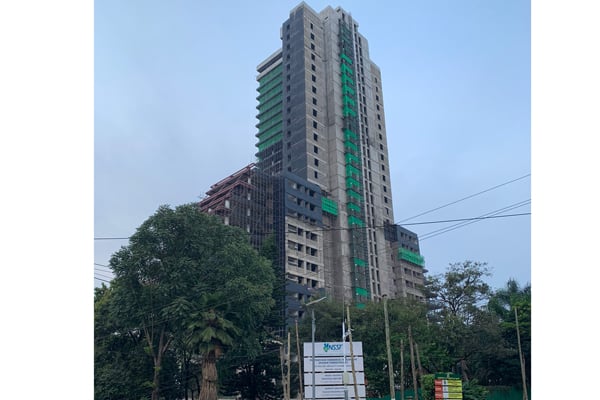Prime
The uneasy relationship between taxes and real estate

Some property owners feel it is unfair not to tax owner-occupied residences. PHOTO/ Rachel Mabala
What you need to know:
When computing rental tax, the tax body deducts allowable expenses which are capped at 75 per cent. Tax to be paid is what remains after expenses.
If one to understand the effect of taxes on any area, they ought first to appreciate the policy behind a given tax law, according to Alex Matovu, a Partner at Signum Advocates. That is because while the policy is the reason behind any law, the law at hand details and enforces the intention of the policy. “Therefore, the first concern is to find out if the laws at hand enable the purpose of the policy? The problem is at times, the laws are not necessarily in line with the policies yet it is these that guide government decision making and enable citizens to hold government accountable,” he shares.
Regarding real estate, the National Housing policy (2016) and the National Investment policy (2018) are key policies to consider. In both policies, there is a clear acknowledgment that Uganda has a housing deficit of about 2m housing units. This number will mostly grow since the resource (land) does not increase in size or expand, while the population grows by the day. This deficit must also be looked at not only in terms of number of housing units but also the quality of housing. “Several factors come into play such as the quality of housing, the number of people occupying each unit, and housing distribution seeing that while the government aims to create or facilitate the creation of at least 200,000 housing units per year, Kampala alone requires 500,000 units. This discrepancy is pegged to the uneven population distribution fostered by uneven infrastructure development,” Matovu says.
This situation calls for serious investment in the real estate sector. Individuals, collective investment schemes as well as foreign direct investment are recognized as key funders for the sector. Investors in the sector are normally keen to know which taxes or statutory duties they are likely to encounter while investing in the sector. These may fall in two categories:-
Tax while you own
Rental tax: This is levied on income earned by a person from letting out immovable property (land and buildings) in Uganda. For income tax purposes, Ian Muhimbise Rumanyika, the acting Assistant Commissioner Public and Corporate Affairs at URA says it does not matter whether the building is let out as a residence or for commercial use. “The rent earned is taxed separately as though it were the only source of income for the taxpayer,” he clarifies.
Rumanyika adds that Section 5(1) Income Tax Cap 340 states that a tax is charged for each income year on every person who has rental income within the year. “Therefore, such a person is obliged to pay rental income tax and failure to do so is enforceable by law,” he says.
Shem Bageine, a real estate expert says previously, individuals were taxed at a rate of 20 per cent and companies at 30 per cent. However, the 2021 amendment, effective July 1 applied a flat rate of 30 per cent for residents and 15 per cent for non-residents.
Matovu says the idea was to create equal treatment for companies and individuals before the law. Due to this equal treatment before the law, the sector is expected to attract more corporate entities as investors, implying more capital injection.
When computing rental tax, the tax body deducts allowable expenses which are now capped at 75 per cent on gross annual rental income. Matovu says, previously, individual allowable expenses were at 20 per cent while for companies there was no limit on allowable deductions.
For example, if a one Acul Ocolo earned annual rent of Shs3.5m from a house in Kitintale, Shs900,000 from a house in Kabale and Shs600,000 from a house in Lyantonde but is also charged an annual interest of 500,000 on a mortgage he got from the bank to build the houses, the tax to be paid would be 30 per cent of what remains after deducting allowable expenses including interest paid on a mortgage. The same applies to companies that are letting out property.
In the case of partnerships, Rumanyika says tax payable by each partner is in proportion to their partnership stake in the partnership.
Challenges
The amendment brought several changes that affected various real estate developers. Besides the increment in tax rate came the scrapping of the annual Shs2.82m threshold (amount below which one was not taxed).
Property rates: Under the Local Government Rating Act 2015, there are rates imposed on all property used for business purposes, even when owner-occupied. While this may not necessarily be called a tax, Matovu says investors normally desire to understand the full spectrum of their statutory obligations of which rates are part of them. “The rate is pegged to an estimate rather than the actual earning of the property. The amount payable is between 0 and 12 per cent while Kampala stands at 6 per cent of the estimated earnings from the property,” Matovu shares.
Challenges
Estimated rates – Matovu says levying an estimated rate may become a challenge in instances where the developer does not get as much as the body has estimated.
Rates are not paid by residential owner-occupied property - Bageine says that is not fair as all property owners access services thus ought to pay for them. “Residential house owners are usually more well off than some of those letting out their property as some are riddled with loans that ought to be paid off. Therefore, exempting owner-occupied residential houses is loading the development burden on developers,” he urgues.
Ground rent: For all foreign investors, the most they can get for property used is a lease. This expense, though not a tax is important for one to be aware of because to address the housing deficit, the attraction of foreign direct investment is key and any foreign investor would be keen to understand the kind of land tenure they can acquire. “Ground rent for leases for local government (KCCA, and municipal) owned land is paid annually as agreed with the respective body or authority considering the property value,” Matovu shares.
Challenges
Monthly VAT remittances- In practice, every tenant signs a tenancy agreement for say five years with quarterly payment terms. Moses Lutalo, the managing director of Broll Uganda says the twist came with the introduction of the EFRIS system, which demands that landlords remit their VAT in a month’s period of issuing the invoice. “The scenario is that for rent of January to March 2022, invoices should be issued to the tenant by December 15, 2021, which is contractually binding for any structured real estate. However, with the EFRIS system, by January 15, 2022, all this VAT must have been remitted. The challenge is that tenants do not necessarily pay on time, a situation worsened by Covid-19, so the tenant might pay in say February 26, 2022. Nonetheless, the landlord is not oblivious to the economic situation thus cannot throw out this tenant because, in the past, their history is without a glitch,” he explains.
If say, 60 per cent of the tenants pay a month late, Lutalo says the landlord must have the cash flow to honour the obligation created upon issuance of the invoice.
Tax upon disposal
Value Added Tax (VAT) - This is only taxed at the sale of commercial property, never applying to owner-occupied residential property except commercial and serviced apartments (Par 1 (f) - 3rd Schedule - VAT Act). The current rate is 18 per cent of the selling price.
Rumanyika says where the property is used for commercial purposes and the income earned is beyond Shs 37.5m every three consecutive months or Shs150m annually, a person who receives such income is obliged to register for VAT and charge VAT.





